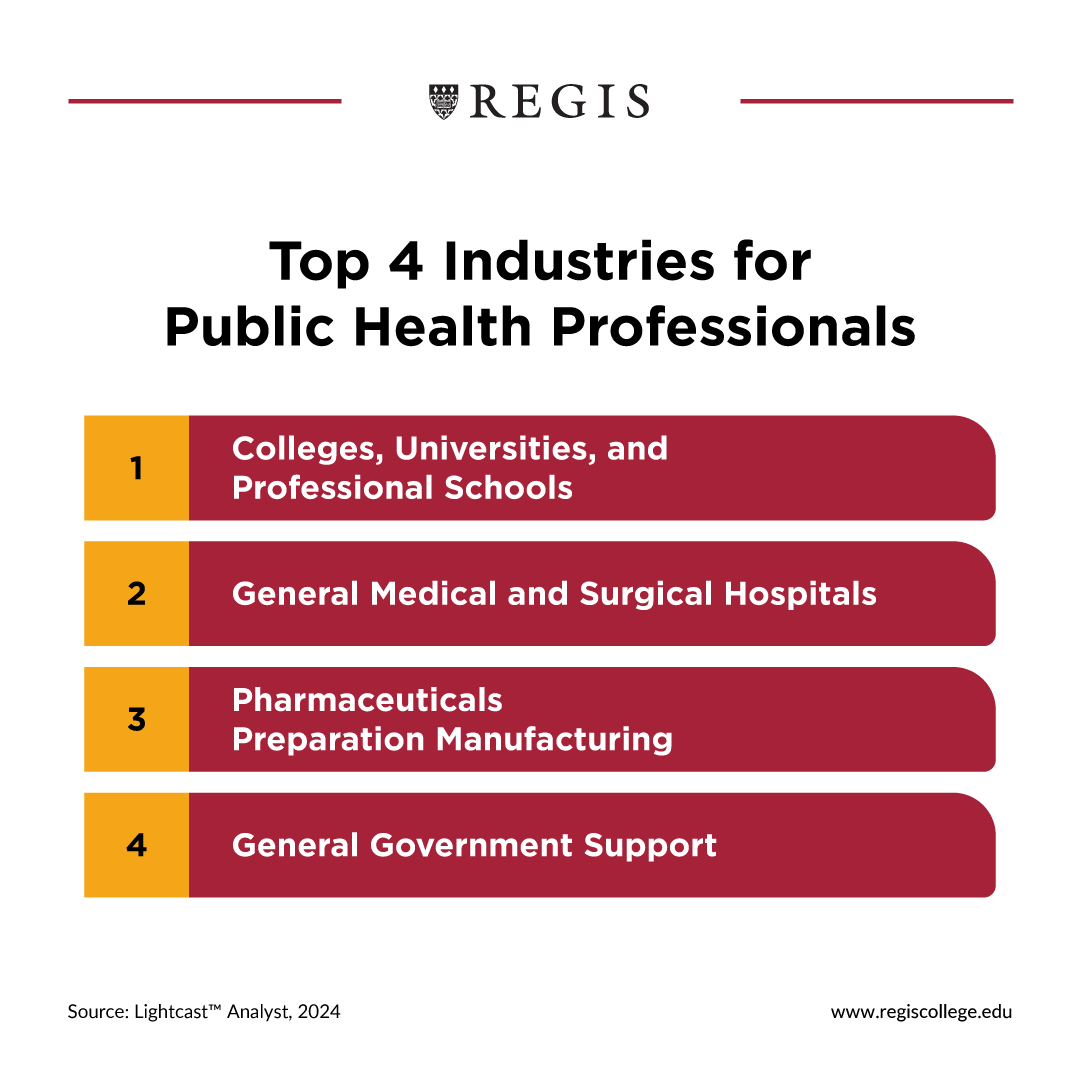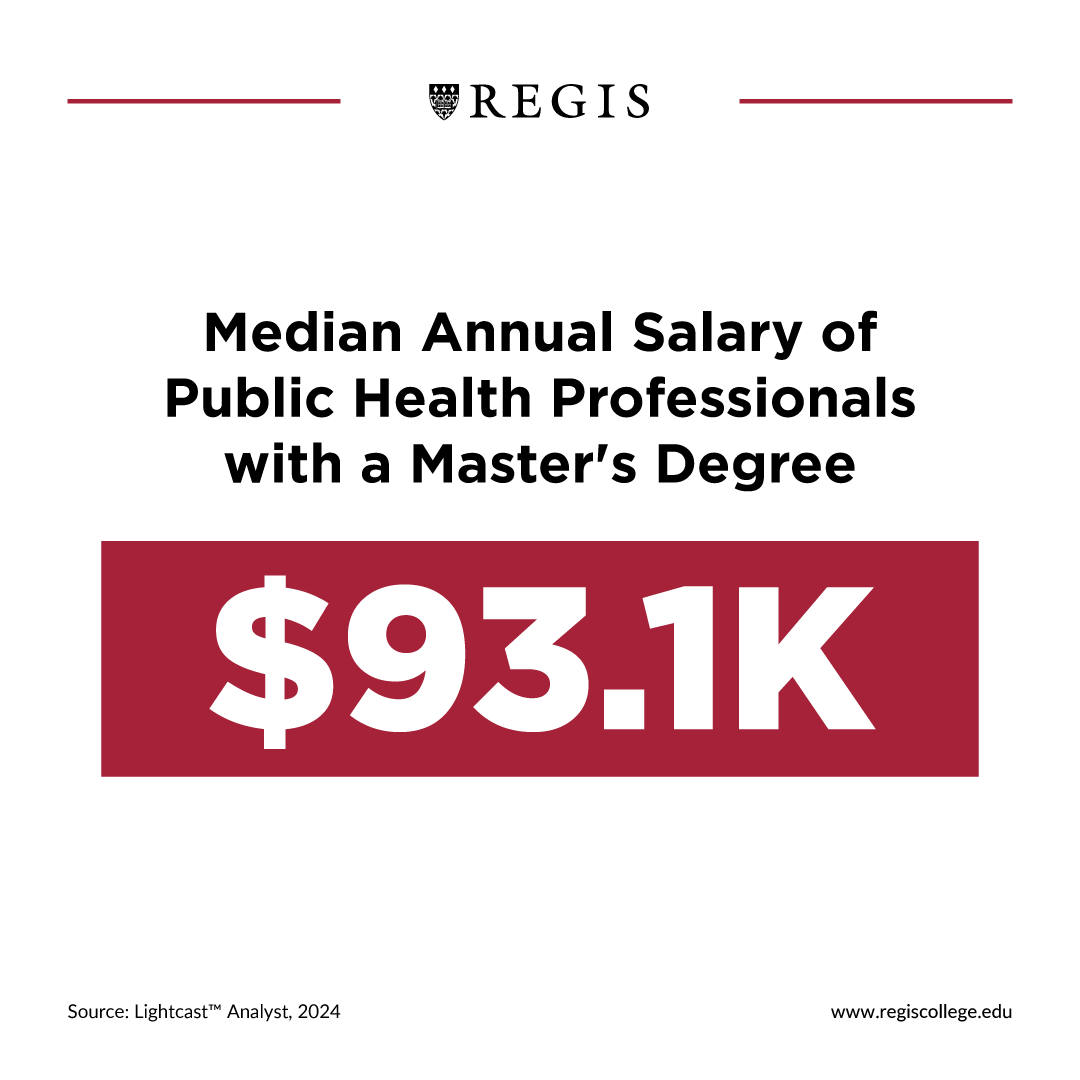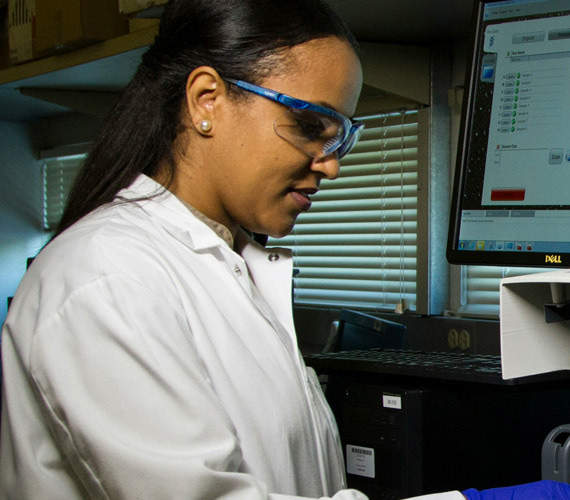When it comes to weighing your public health career options, there are several factors you should consider before settling on a particular path. While making a difference in their community is often the key motivation for public health professionals, potential salary, job demand, and employment trends are also extremely important.
Below, we take a closer look at the top public health careers to help you decide which one is right for you.
Is Public Health a Good Career Path?
Choosing a career in public health can be highly rewarding, offering diverse opportunities to improve community health, influence public health policies, facilitate systemic change, and contribute to global health initiatives.
According to our analysis of job posting data, public health professionals are employed in several industries, including:
- Colleges, universities, and professional schools
- General medical and surgical hospitals
- Pharmaceuticals preparation manufacturing
- General government support

With so many industries hiring public health professionals it isn’t surprising that the field is expected to grow at a rate of approximately seven percent between 2022 and 2032—which is faster than the national average.
In addition to immense opportunities in public health, this career path is incredibly rewarding if you want to make a difference in your community. Public health professionals are essential to the fight against health disparities and equitable healthcare access for underserved populations.
However, these topics are incredibly complex and challenging. So it’s essential to consider the public health skills and education required to excel in this field.
The Value of a Public Health Education
There are a few educational paths to consider if you want to hone your skills and become an effective public health advocate.
For example, several professionals in the field have a bachelor’s degree in public health or a related field. And while other health-related degrees can provide a good foundation, a bachelor’s degree in public health covers a variety of topics, including:
- Epidemiology
- Biostatistics
- Health policy
These topics ensure that graduates are equipped with the knowledge needed to take on a variety of roles that work to improve community health.
“This is probably one of the few degrees where you can have such a large impact on peoples’ health,” says Dr. Leslie Mandel, associate professor of Regis College’s public health program. “With public health you’re dealing with the health of communities and populations, so the work you’re doing—either behind the scenes or face to face—can reach the largest number of people.”
While a bachelor’s-level education is enough for some roles in public health, earning a master of public health (MPH) degree can take your career to the next level in several ways.
For example, Dr. Frazier Beatty, director of the Online Master of Public Health degree program at Regis College, describes an MPH as “more of a practitioner degree” that focuses on the practical application of public health concepts covered in a bachelor’s degree program.
Earning an MPH can also enhance your earning potential in the field, ensuring long-term financial stability. According to our analysis of job postings data, the median annual salary of public health professionals with a master’s degree is $93,100.

If you’re interested in making a significant impact in your community, advancing your education is vital to your standing in the field. Here are eight possible careers you can obtain if you earn an advanced degree in public health.
Top Eight Careers in Public Health

1. Epidemiologist
Median Annual Salary: $77,100
An epidemiologist is a public health professional who investigates patterns and causes of diseases. Their main objective is to reduce the risk of negative health outcomes affecting communities through research, health education, and public health policy.
Epidemiologists can work in a variety of specializations, including:
- Infectious diseases
- Chronic diseases
- Environmental health
These professionals typically hold an MPH with a focus in epidemiology—even at the entry level. This is largely because the role requires advanced research and analytical skills, in addition to a firm understanding of public health policy.
Pursuing a career in epidemiology presents a unique mix of challenges and rewards worth considering. Although the role demands urgent responses to health crises, the satisfaction of contributing to public health interventions in the community surpasses these challenges.
2. Environmental Health Specialist
Median Annual Salary: $61,400
An environmental health specialist, also known as an environmental health officer or public health inspector, focuses on assessing environmental risks such as water and air quality, waste management systems, and housing conditions.
While all of these factors intersect with other industries, environmental health specialists ensure community health isn’t negatively impacted by these environmental factors.
Some ways environmental health specialists do this is by:
- Inspecting and enforcing health laws and regulations
- Investigating complaints and reported illnesses
- Assessing environmental risks in communities
- Educating the public on prevention strategies
Public health education is pivotal to this role since environmental health specialists need a firm understanding of both environmental science as well as public health strategies that can address these risk factors.
3. Biostatistician
Median Annual Salary: $111,900
A biostatistician utilizes statistical principles and methodologies to collect, analyze, and interpret data. In public health, this skillset is used to organize health data to inform public health policies, understand health trends, and solve complex health problems.
For example, if a new disease outbreak impacts a large urban community, biostatisticians can provide clarity on factors such as transmission and additional health risks through data analysis of the disease’s spread and outcomes.
This information is utilized in several ways including:
- Enhancing outbreak response
- Informing public health decision-making
- Supporting health policy development
Considering how this information is used, biostatisticians can greatly benefit from an MPH because it provides a deeper understanding of epidemiological principles needed to contribute to the field.
4. Public Health Researcher
Median Annual Salary: $84,700
A public health researcher conducts studies to better understand health and diseases among populations. These studies investigate a wide range of public health trends, including:
- Effectiveness of public health programs and policies
- Determinants of health in various communities
- Environmental risks and possible interventions
Since this role tends to work within the academic industry, several public health researchers are employed at universities and research institutions. However, these findings often contribute to developing public health guidelines, regulations, policies, and programs, so public health researchers can also work in settings like government agencies, non-profit organizations, and healthcare facilities.
Becoming a public health researcher offers the unique opportunity to directly impact global health outcomes, informing the development of interventions, policies, and strategies to prevent disease and promote wellness worldwide. As a result, this is an excellent career for those passionate about driving systemic change on a large scale.
5. Nurse Practitioner
Median Annual Salary: $126,300
A nurse practitioner (NP) is a healthcare professional who has extensive education and clinical training beyond a registered nurse. NPs are qualified to perform a broad range of healthcare services, including:
- Diagnosing and treatment medical conditions
- Prescribing medication
- Managing patient care
While this role often revolves around the clinical side of healthcare, NPs can also play an important role in public health. This is largely because of their close contact with members of the community who are experiencing health challenges.
For example, NPs might see an upward trend of diabetic patients in their office. To combat this problem, they can work to implement a community-wide screening program that identifies at-risk patients who could benefit from immediate lifestyle changes.
Whether or not NPs utilize these types of health interventions, they do play a pivotal role in the response efforts of public health crises. During disease outbreaks that require vaccines, nurses are the ones who manage, distribute, and administer vaccinations.
6. Public Health Director
Median Annual Salary: $101,600
A public health director is one of the most senior-level roles in the field. They oversee the planning, implementation, and evaluation of public health policies and programs at the city-, county-, or state-level.
Some key responsibilities of a public health director include:
- Preparing the community for public health emergencies
- Partnering with supportive healthcare providers
- Assessing public health programs effectiveness
- Collaborating on public health policy implementation
This role requires a blend of scientific knowledge, leadership skills, and strategic planning to ensure their community is healthy. Therefore, prospective directors need an advanced degree in public health, along with extensive industry experience, to effectively address the complex health needs of communities.
7. Infection Preventionist
Median Annual Salary: $102,700
An infection preventionist specializes in preventing and controlling the spread of infections in healthcare settings such as hospitals, clinics, and long-term care facilities. This ensures patients and other healthcare providers remain safe in these settings.
Some ways infection preventionists due this include:
- Monitoring infections with a facility to identify trends and potential source
- Training healthcare staff on infection control practices
- Overseeing infection protocol to ensure compliance
Since these public health professionals work in healthcare settings, it isn’t surprising that most infection preventionists are nurses, epidemiologists, and microbiologists. However, if you’re interested in improving patient and healthcare worker safety, this is still a great public health career option.
8. Health Program Manager
Median Annual Salary: $90,900
A health program manager is responsible for overseeing the planning, implementation, and evaluation of health-related programs and initiatives. Their primary goal is to improve public health outcomes through highly effective community programs that address relevant health issues.
The management of these programs often requires:
- Managing teams of public health advocates
- Developing and managing program budgets
- Collaborating with community leaders, healthcare providers, and government officials
- Communicating program goals, progress, and outcomes to stakeholders
As a central figure in community health, health program managers need strong leadership skills and an in-depth understanding of public health education. This specialized training gives you the tools to navigate the complexities of public health initiatives.
The Future of Public Health
Public health careers offer a unique opportunity to blend passion with profession, allowing individuals to make a significant difference in their community.
Education can unlock the door to this rewarding career path, providing the skills, knowledge, and credentials necessary to excel and innovate in the field. For example, Regis College's Master of Public Health (MPH) degree program can help students become leaders in public health.
Whether you aim to combat emerging health threats, influence health policies, or improve community health outcomes, advancing your public health education at Regis College can propel your career to new heights.
To learn more about the program, contact an admissions counselor to find out how an education at Regis can serve your professional goals.




